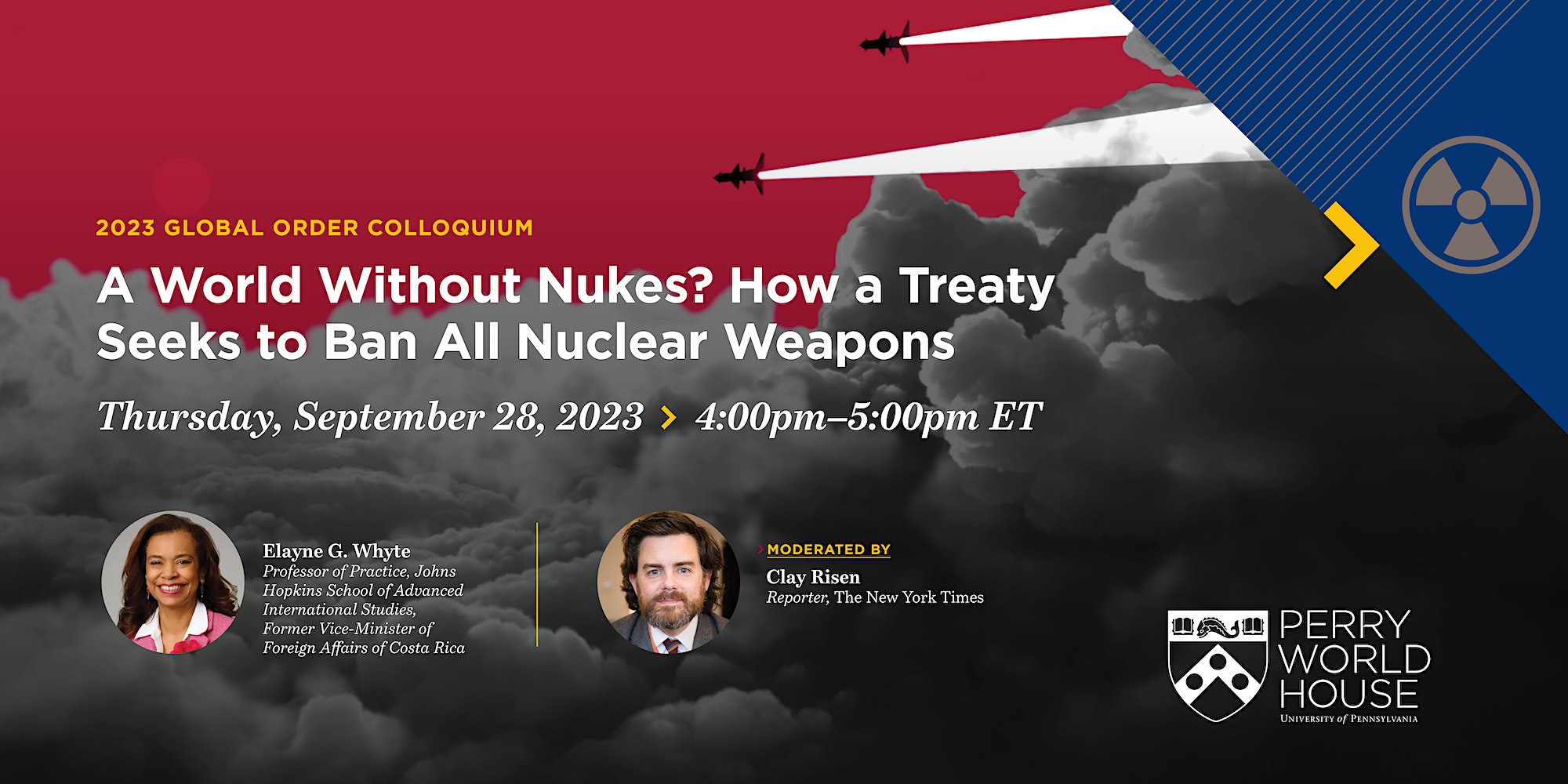Please be sure to check the event organizer’s website for any last-minute changes or cancellations prior to attending.
Have an event that will fit well on our calendar?

- This event has passed.
A World Without Nukes? How a Treaty Seeks to Ban All Nuclear Weapons

Can countries around the globe band together to ban nuclear weapons? That is the goal of the Treaty on the Prohibition of Nuclear Weapons, an international treaty that outlaws nuclear armaments. Since its entry into force in 2021, 65 states have ratified the agreement, and it has become a touchpoint around which countries without nuclear arsenals are working to drive new norms. No nuclear powers have agreed to sign onto the treaty and destroy their nuclear arsenals to date. In fact, the nuclear great powers—China, Russia, and the United States—are modernizing their arsenals. Some European countries and US allies have curtailed the US’s ability to transport nuclear weapons on their territory as a result of the treaty’s adoption.
What did it take to negotiate a treaty that bans the weapons underwriting global (in)security and great power competition? Can states without nuclear might ever really set the global security agenda, and if so, what role might this treaty play? What will it take to completely eradicate nuclear weapons from the planet? What is an achievable goal for the future of the TPNW?
Join Perry World House for its 2023 Global Order Colloquium on A New Age of Nuclearity? Great Powers and Greater Consequences, where Elayne Whyte Gómez, the first President of the TPNW negotiations and Costa Rica’s former ambassador to the United Nations Geneva Headquarters, will discuss the past, present, and future of the TPNW.
SPEAKER
Elayne G. Whyte is a Professor of Practice at Johns Hopkins School of Advanced International Studies -SAIS- and a renowned diplomat from Costa Rica, with special experience in the fields of security, human rights, regional integration and global governance. She is the former Vice-Minister of Foreign Affairs of Costa Rica and was the first woman, and the first person of African descent, to hold this office. She served as Ambassador and Permanent Representative of Costa Rica to the United Nations. In 2017 she was President of the United Nations Conference involving 124 states that negotiated and adopted the Treaty on the Prohibition of Nuclear Weapons, which entered into force in 2021.
MODERATOR
Clay Risen, a reporter for the New York Times, is the author of several books on US history, including, most recently, The Crowded Hour: Theodore Roosevelt, The Rough Riders and the Dawn of the American Century, a finalist for the Gilder-Lehrman Prize in Military History. Previously at the Times, he worked as a senior politics editor and deputy Opinion editor, and before that as the founding managing editor of Democracy: A Journal of Ideas and an assistant editor at the New Republic. His other books include A Nation on Fire: America in the Wake of the King Assassination and the forthcoming Red Scare: Blacklists, McCarthyism and the Making of Modern America. He has an undergraduate degree from the Georgetown University School of Foreign Service and a master’s degree in social science from the University of Chicago.
INTRODUCTION BY
Dean Antonia M. Villarruel is the Margaret Bond Simon Dean of Nursing at the University of Pennsylvania. Villarruel leads a world-renowned faculty to advance science, demonstrate practice excellence, and prepare leaders in the discipline of nursing—all through her extraordinary lens as a first-generation college graduate and daughter of an immigrant, an innovative nurse-researcher, the first—and to date only—Latina nurse inducted as a National Academy of Medicine member, and one of the few Latina nursing deans in the United States, not to mention the only Latina nursing dean at an Ivy League school.
Details
- Date: September 28, 2023
-
Time:
4:00 pm - 5:00 pm
- Website: https://www.eventbrite.com/e/a-world-without-nukes-how-a-treaty-seeks-to-ban-all-nuclear-weapons-registration-716086011537
Venue
- Perry World House
-
3803 Locust Walk
Philadelphia, PA 19104 United States

